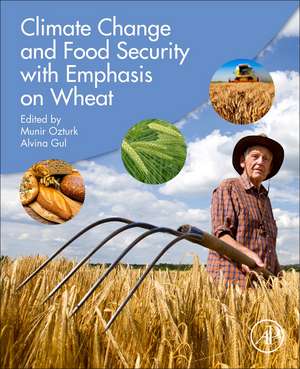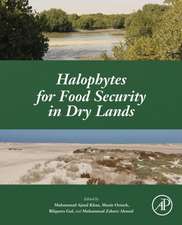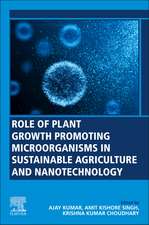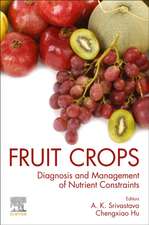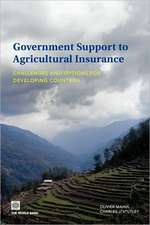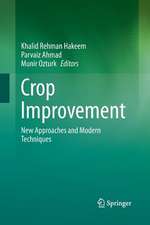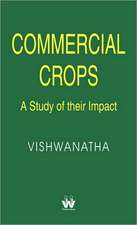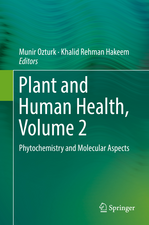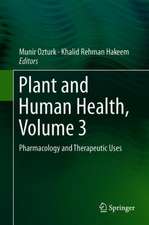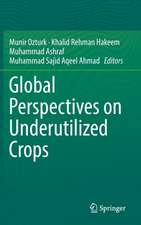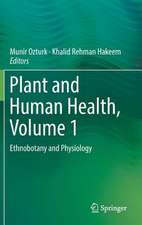Climate Change and Food Security with Emphasis on Wheat
Editat de Munir Ozturk, Alvina Gulen Limba Engleză Paperback – 3 apr 2020
Addressing the biophysical and socioeconomic constraints of producing high-yielding, disease-resistant, and good quality wheat, this book will aid in research efforts to increase and stabilize wheat production worldwide.
Written by an international team of experts, Climate Change and Food Security with Emphasis on Wheat is an excellent resource for academics, researchers, and students interested in wheat and grain research, especially as it is relevant to food security.
- Covers a wide range of disciplines, including plant breeding, genetics, agronomy, physiology, pathology, quantitative genetics and genomics, biotechnology and gene editing
- Explores the effect of climate change on biotic stresses (stripe rust, stem rust, leaf rust, Karnal bunt, spot blotch) on wheat production and utilization of biotechnology
- Focuses on whole genome sequencing and next-generation sequencing technologies to improve wheat quality and address the issue of malnutrition in developing world
Preț: 918.25 lei
Preț vechi: 1184.21 lei
-22% Nou
Puncte Express: 1377
Preț estimativ în valută:
175.73€ • 182.79$ • 145.07£
175.73€ • 182.79$ • 145.07£
Carte tipărită la comandă
Livrare economică 07-21 aprilie
Preluare comenzi: 021 569.72.76
Specificații
ISBN-13: 9780128195277
ISBN-10: 0128195274
Pagini: 384
Dimensiuni: 216 x 276 mm
Greutate: 0.9 kg
Editura: ELSEVIER SCIENCE
ISBN-10: 0128195274
Pagini: 384
Dimensiuni: 216 x 276 mm
Greutate: 0.9 kg
Editura: ELSEVIER SCIENCE
Public țintă
Researchers and academics focused on wheat and grain research specifically but also as relevant to the impact of production on food securityCuprins
1. Better Farming Practices to Combating Climate Change
2. Ensuring Sustainable Food Security: Exploiting alien genetic diversity in wheat breeding for adaptation to emerging Stresses
3. Assessing Climate Change Impacts on Wheat Production in Turkey and Various Adaptation Strategies
4. Cellular Mechanism of Salinity Tolerance in Wheat
5. Genes Controlling Salinity Tolerance in Wheat
6. Role of Osmoprotectants in Salinity Tolerance in Wheat
7. Salt Responsive Transcription Factors in Wheat
8. Molecular Mechanism of Drought Tolerance in Wheat
9. Cellular Mechanism of Drought Tolerance in Wheat
10. Drought Responsive ESTs in Wheat
11. Role of Transcription Factors in Drought Mediating Pathways in Wheat
12. LEA Proteins and Drought Stress in Wheat
13. Role of Osmoprotectants in Drought Tolerace in Wheat
14. Role of Spot Blotch Resistance in Global Food Security
15. Karnal Bunt (Tilletia Indica) in Wheat
16. Wheat-Thinopyrum Intermedium Introgression Lines Enhancing Wheat Streak Mosaic Virus (WSMV) Resistance
17. Climate Chnage Leading to Post Harvest Losses in Breadwheat
18. Investigation of the Effects of Environmental Stresses on the Development and Yield of Wheat Seedlings with Physiological, Biochemical Parameters and Some Gene Expressions
19. Potentially Toxic Trace Elements in Wheat and their Effects on the Plant Development and Essential Nutrients
20. Transfer of the Wheat Heritage of Antolia to Future Generations
21. Landraces: Widening the narrow gene pool of wheat
22. Next Generation Sequencing in Bread Wheat
23. Genomic Selection in Wheat
24. Role of Gene Editing in Wheat Improvement
25. The Economics of Climate Change and Food Insecurity
2. Ensuring Sustainable Food Security: Exploiting alien genetic diversity in wheat breeding for adaptation to emerging Stresses
3. Assessing Climate Change Impacts on Wheat Production in Turkey and Various Adaptation Strategies
4. Cellular Mechanism of Salinity Tolerance in Wheat
5. Genes Controlling Salinity Tolerance in Wheat
6. Role of Osmoprotectants in Salinity Tolerance in Wheat
7. Salt Responsive Transcription Factors in Wheat
8. Molecular Mechanism of Drought Tolerance in Wheat
9. Cellular Mechanism of Drought Tolerance in Wheat
10. Drought Responsive ESTs in Wheat
11. Role of Transcription Factors in Drought Mediating Pathways in Wheat
12. LEA Proteins and Drought Stress in Wheat
13. Role of Osmoprotectants in Drought Tolerace in Wheat
14. Role of Spot Blotch Resistance in Global Food Security
15. Karnal Bunt (Tilletia Indica) in Wheat
16. Wheat-Thinopyrum Intermedium Introgression Lines Enhancing Wheat Streak Mosaic Virus (WSMV) Resistance
17. Climate Chnage Leading to Post Harvest Losses in Breadwheat
18. Investigation of the Effects of Environmental Stresses on the Development and Yield of Wheat Seedlings with Physiological, Biochemical Parameters and Some Gene Expressions
19. Potentially Toxic Trace Elements in Wheat and their Effects on the Plant Development and Essential Nutrients
20. Transfer of the Wheat Heritage of Antolia to Future Generations
21. Landraces: Widening the narrow gene pool of wheat
22. Next Generation Sequencing in Bread Wheat
23. Genomic Selection in Wheat
24. Role of Gene Editing in Wheat Improvement
25. The Economics of Climate Change and Food Insecurity
